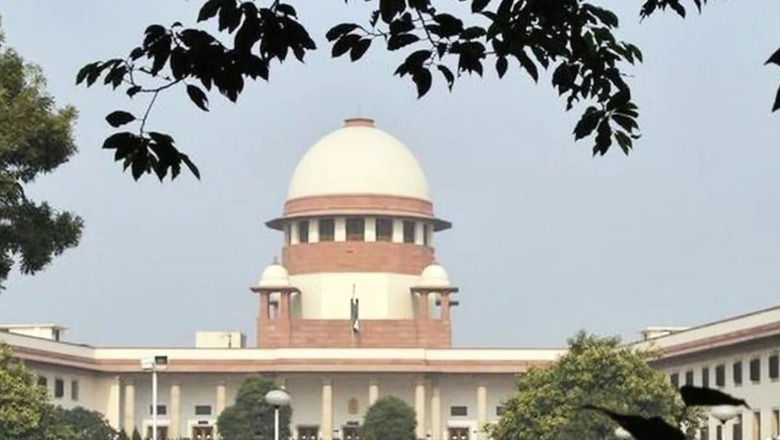
views
The Centre has defended its vaccine policy in the Supreme Court’s suo moto case on the Covid-19 crisis in the country, saying that states were given the opportunity to procure jabs on their requests to the government.
A 375-page affidavit was filed by the Union Ministry of Health and Family Welfare in response to a slew of questions raised by the apex court in its May 31 order while hearing the suo motu case related to Covid management in the country. The government said it has been reviewing its vaccination policy dynamically since May this year.
It said the government was aiming towards ‘vaccination-for-all’ by December this year.
The total population of the country aged 18 years and above is approximately 93-94 crore. Administering two doses to these beneficiaries would require an estimated 186 to 188 crore vaccine doses.
The Centre said it is making the necessary arrangements for the required doses. It also provided the cost break-up of the vaccines in its affidavit. According to the document, approximately Rs 10,000 crore has been spent/allocated for vaccine procurement, so far.
The Centre told the apex court that a poor person and a multi-millionaire in the age group of 18 years and above are equally entitled to get the Covid vaccine free of cost and every effort is being made to ensure access of “safe and effective” ones at the earliest in the country.
A bench headed by Justice D Y Chandrachud had slammed the Centre’s Covid vaccination policy, describing as “prima facie arbitrary and irrational” allowing states and private hospitals to charge those in the 18-44 age group while the jabs were offered free for groups in the first two phases, and ordered its review.
Seeking to scrutinise the Covid vaccination policy in detail, the top court had also asked the Centre to provide information including as to how Rs 35,000 crore, earmarked for vaccines, has been spent so far, and to place on record all relevant documents and file notings reflecting its thinking culminating in the policy.
Bringing the revised “Covid-19 Vaccine Operational Guidelines” on the record, the Centre’s reply affidavit said, “Under the revised guidelines, government of India will procure vaccine and supply free of cost to the states/ UTs to vaccinate all persons above 18 years of age from 21.06.2021 and this will ensure that 18-44 years persons will also receive free vaccine from government Covid vaccination centres.”
Only those who have the ability to pay and voluntarily chose to pay are encouraged to use private hospitals’ vaccination centres so that the stress on public utilities can be reduced to the extent possible, it said.
The sum total of revised and reviewed vaccination programmes is that the Central government will procure vaccines and make every effort possible to ensure that the people of India have access to safe and effective vaccines at the earliest, the reply affidavit said.
It said more than 31 crore vaccine doses have been administered across the country. The affidavit also dealt with the issue of shortage of medicines like Amphotericin to deal with Mucormycosis, and Remdesivir.
Efforts on to Procure Other Vaccines
The Centre in its affidavit said the vaccination drive would get a boost of the government succeeded in its attempts to procure vaccines available outside India – Pfizer, Johnson & Johnson, Moderna, etc. It said efforts for the same were ongoing on the highest political executive and diplomatic levels of the country.
On CoWin Platform
There is no question of anyone being left out in the COVID-19 vaccination drive due to “digital divide” and the Co-WIN system is designed to provide required flexibilities to states and Union Territories to overcome barriers to access, the Centre told the Supreme Court.
Online registration, prior self-registration and booking of appointment on Co-WIN is also not mandatory to avail vaccination services, it stated. The bench headed by Justice D Y Chandrachud had in its May 31 order observed that a vaccination policy exclusively relying on digital portal Co-WIN for inoculating those aged between 18 to 44 years would be unable to meet its target of universal immunisation due to “digital divide” and marginalised sections of society would bear the brunt of “accessibility barrier”.
“It is submitted that the Co-WIN system is inclusive and has been designed to provide the necessary features and the required flexibilities to states/UTs and their officials to overcome the challenges posed by various state specific problems and barriers to access,” the government said in its affidavit. “There is no question of any person being left out due to any digital divide. Thus, it may not be correct to conclude that the technology or methodology adopted is resulting in exclusion of some persons or any particular class,” it said.
It is submitted that, as on June 23, that of the 32.22 crore beneficiaries registered on Co-WIN, 19.13 crore (59 per cent) beneficiaries have been registered in the onsite — walk-in or non-digital — mode, it said. The affidavit said if a person having no access to either internet or digital devices or does not wish to self-register wants to be vaccinated, he or she can visit the nearest vaccination centre where a health worker would register him in the device of the respective centre on the Co-WIN platform and the person would be vaccinated. It said that all the necessary features to ensure that every eligible individual has access to vaccination, regardless of any of physical, digital or socio-economic barriers to access, have been incorporated in Co-WIN.
The affidavit said that on-site registrations, also known as walk-in registration, and vaccinations have been permitted for all beneficiaries through a May 23 circular. “Therefore, on and from May 23, 2021, any person above the age group of 18 years can visit any vaccination centre and get vaccinated without himself/herself pre-registering on Co-WIN platform,” it said.
The affidavit said it is understandable that rural and tribal areas in the country have lower access to digital mediums and internet, and the Centre is fully cognisant of the same. The Centre, being aware of the situation, has adopted various other modes to provide citizens with the vaccine in such areas, it said. The affidavit said that “as reported by states on Co-WIN, in the period from May 1, 2021 till June 23, 2021, out of the total 1,31,204 Covid Vaccination Centres (CVCs) providing vaccination services, 33,342 are operated at sub-health centres, 28,168 at the primary health centres and 9,932 at the community health centres, amounting to 54.45 per cent of the total vaccination centres”.
“The CVCs at the sub-health centres, the primary health centres and the community health centres are in rural areas,” it said and also mentioned that a feature for tagging vaccination centres as rural or urban has been introduced in Co-WIN with effect from June 5. “Out of the total 1,24,969 vaccination centres so far classified by state governments on Co-WIN as rural centre or urban centre, 93,044 vaccination centres i.e. 74.45 per cent, are located in rural areas,” it said.
The affidavit said that according to data available on Co-WIN, as on June 23, out of the total 29.68 crore vaccine doses recorded on Co-WIN, 23.12 crore doses (nearly 78 per cent of all vaccine doses) have been administered through onsite or walk-in vaccination. It said that as on June 23, 1,50,988 persons without identity cards have been vaccinated as per the prevailing system.
The affidavit said that “39,01,126 beneficiaries have been vaccinated through the functionality of near-to-home vaccination sessions, introduced recently”. It said that according to data available on Co-WIN, as on June 23, vaccination per million population in tribal districts is better than the national average. The government in its affidavit said that “97 out of 176 tribal districts are performing better than all India vaccination coverage” and added that “more walk-in vaccinations are happening in tribal districts as compared to the national average”.
It said in order to further improve access for citizens as well as field functionaries operating the Co-WIN portal, multi-lingual citizen and user interfaces are now available in 12 languages on Co-WIN, including Hindi, Marathi, Malayalam, Telugu, Oriya, Gurumukhi, Bengali and English. The affidavit said that several measures have already been taken to improve the access for those who are visually challenged.
“Directions are given to all district level officers for providing assistance to differently abled persons for matter related to COVID-19,” it said, adding that “in addition, the Union Ministry of Health and Family Welfare has recently issued directions to states/UTs to facilitate differently abled persons and senior citizens in Covid accination”.
Read all the Latest News, Breaking News and Coronavirus News here.



















Comments
0 comment